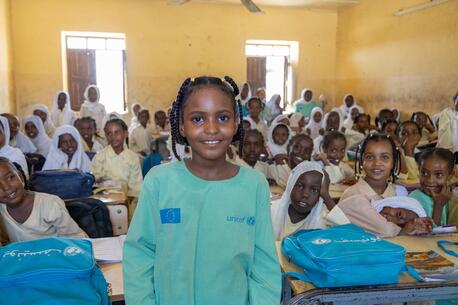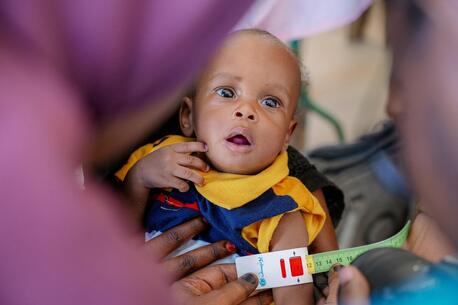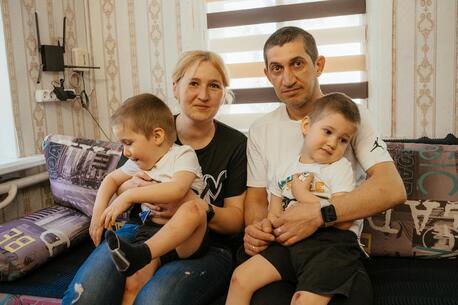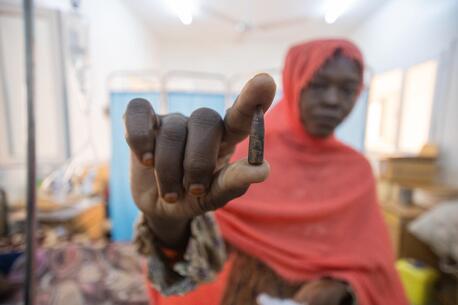
Hit by a Stray Bullet in Sudan
Ongoing conflict in Sudan has left more than 70 percent of health facilities inoperable. UNICEF is working with partners to support the country's flagging health system, providing lifesaving care for children like 8-year-old Fatima.
At Aljekaika hospital in northern Sudan, Samah stares helplessly at her daughter Fatima. Occasionally, she rubs her head to ease the pain, helps her sit up for a sip of water and wishes she could take her place. The 8-year-old lies in a hospital bed, restless, her eyes full of fear.
A few days ago, she underwent surgery to remove a bullet lodged in the back of her head. The painful experience has left her with deep fear and trauma. She panics and cries out whenever her mother is out of her sight.
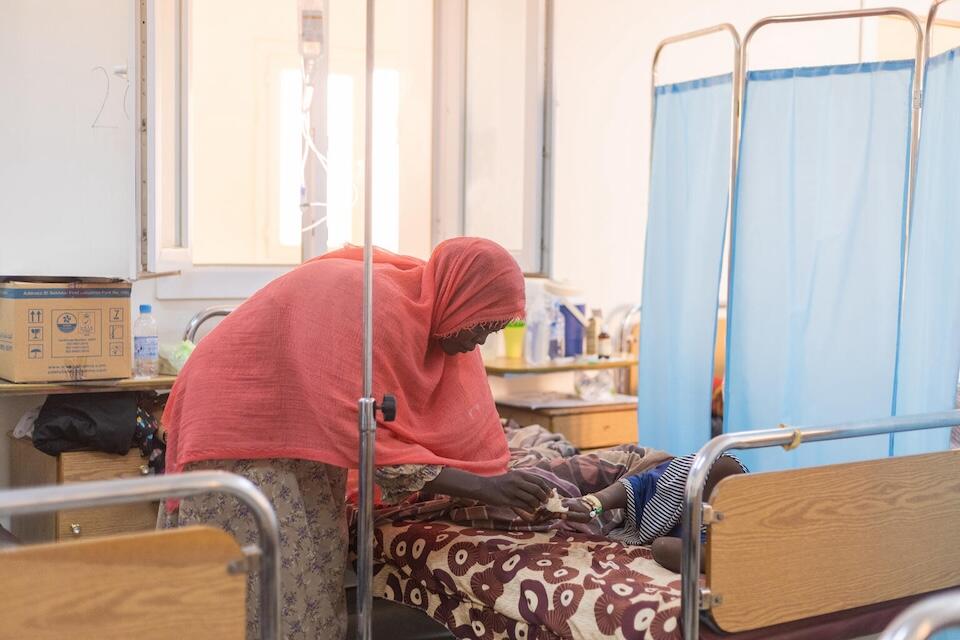
Trapped in war-torn Khartoum
When the war started, Samah didn’t leave her home in Omdurman, just a few kilometers from Khartoum, Sudan. With limited resources and an uncertain future, she and her children stayed behind, close to active fighting and all the challenges that came with that decision.
“There was nowhere else for me to go,” she says with pain in her voice and tears in her eyes.
Days and months passed, then a year, until recently, when the vulnerable family was caught in the line of danger.
How it happened
On the fateful day, while the family was enjoying breakfast, Fatima suddenly started screaming. Seconds later, she was on the ground, blood oozing out of her ears. She had been hit by a stray bullet.
Frantic and unsure of what to do next, Samah ran to the neighbors for help. They too were helpless, trapped in a city where most hospitals are non-operational. The nearest facility couldn’t provide the immediate support needed to save Fatima’s life.
Continuous attacks on hospitals have left over 70 percent of health facilities in Sudan nonfunctional, with supplies running low and replenishing difficult due to limited access.
Watch the video:
Samah was eventually referred to Aljekaika hospital, a UNICEF-supported facility in Shendi. Dr. Maria* [last name withheld for privacy] was part of the team that received Fatima. “They were both distressed. Fatima was experiencing headaches and intermittent loss of consciousness," the doctor said. "We provided all the necessary resuscitation and preparatory measures for the surgery and were able to extract the bullet.”
Samah recalls, “Those were very difficult and long hours. I prayed to God to heal my daughter.”
Slowly but painfully getting back on her feet
Following the successful surgery, Fatima is now recovering. But she will need counseling and rehabilitation to return to the cheerful girl she once was — services the hospital will provide free of charge. “She is now recovering, able to speak and walk, though still affected by the trauma,” Dr. Maria says.
As Samah closely watches her daughter, with bandages on her head, she recalls the good old days. “Fatima loved playing with dolls and teddy bears, and she also liked to draw a lot," she says. "She was an outstanding pupil from first through third grade. I hope the war will not rob all this from my child.”
Fatima loved playing with dolls and teddy bears, and she also liked to draw a lot. She was an outstanding pupil from first through third grade. I hope the war did not rob all this from my child.
As the war enters its second year, grave violations of children’s rights — including maiming — continue. Fatima is one of many who will live with similar scars for the rest of their lives.
“These events are heartbreaking," says Dr. Maria. "To see an 8-year-old child, who should be playing and enjoying her childhood with family, instead come to us in distress, and crying in pain. We witness similar cases every day, but with different names.”
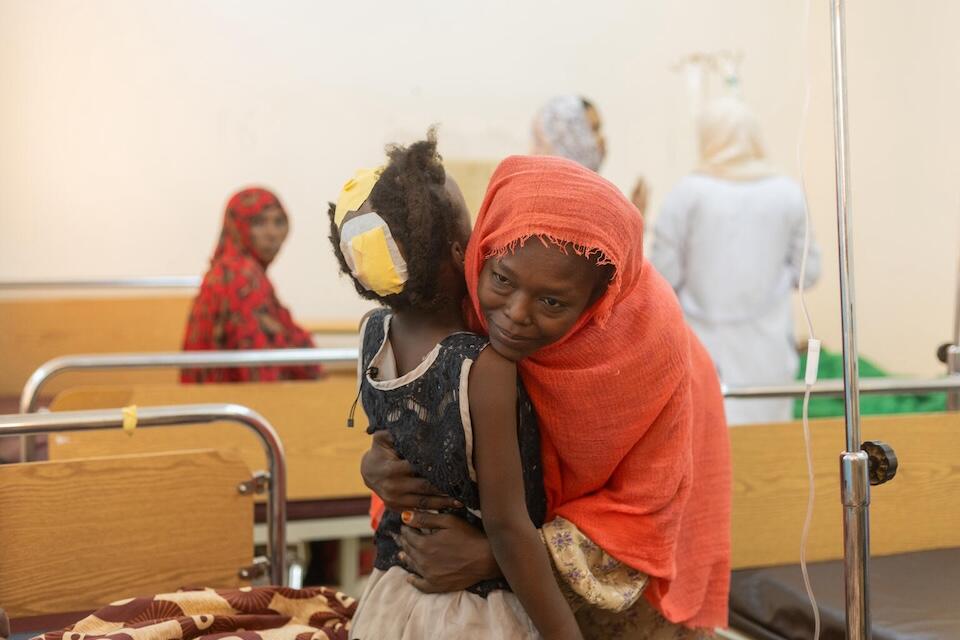
UNICEF is working with partners to meet the needs of children in Sudan
As Samah awaits her daughter’s recovery, she holds onto the object that almost took Fatima’s life. “Whenever I see the bullet that was in my child's head, I cry a lot and thank God for saving her,” she says.
Since the onset of the war, UNICEF has been supporting the delivery of health and nutrition supplies at Aljekaika hospital, located about 90 kilometers northeast of Khartoum. The critical health supplies support delivery of health care services, including surgeries for those injured in hot spots like Khartoum.
Whenever I see the bullet that was in my child's head, I cry a lot and thank God for saving her.
The hospital has reported a significant caseload across the various units, with a surge in surgeries. More than 200 gunshot-related cases are registered weekly; 25 percent of them involve children.
Thanks to the Governments of Norway and Sweden, and the European Union Humanitarian Aid (ECHO), UNICEF is able to provide support for children affected by armed conflict, including through response interventions — physical recovery and rehabilitation — for vulnerable and at-risk children like Fatima.
Your contribution can help UNICEF reach more children in Sudan with urgently needed support. Please donate today.
Learn more about how UNICEF is helping Sudan's children.
This story first appeared on unicef.org
HOW TO HELP
There are many ways to make a difference
War, famine, poverty, natural disasters — threats to the world's children keep coming. But UNICEF won't stop working to keep children healthy and safe.
UNICEF works in over 190 countries and territories — more places than any other children's organization. UNICEF has the world's largest humanitarian warehouse and, when disaster strikes, can get supplies almost anywhere within 72 hours. Constantly innovating, always advocating for a better world for children, UNICEF works to ensure that every child can grow up healthy, educated, protected and respected.
Would you like to help give all children the opportunity to reach their full potential? There are many ways to get involved.



